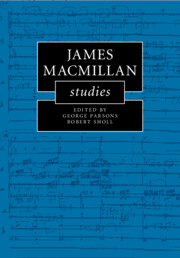Book contents
- James MacMillan Studies
- James MacMillan Studies
- Copyright page
- Contents
- Music Examples
- Tables
- Contributors
- Foreword
- Acknowledgements
- Introduction
- 1 The Struggle with Conviction: A Trio of String Quartets
- 2 Conflicting Modernities and a Modernity of Conflict in James MacMillan’s The World’s Ransoming
- 3 In Memoriam: James MacMillan’s Violin Concerto as Modernist Lament
- 4 Reincarnating The Tryst: The Endurance of a Simple Love Song
- 5 Exquisite Violence: Imagery, Embodiment and Transformation in MacMillan
- 6 Making the Familiar Unfamiliar: MacMillan’s St Luke Passion
- 7 MacMillan’s ‘Mission’ and the Passion Settings
- 8 A Cluster of Gathering Shadows: Exposition and Exegesis in Seven Last Words from the Cross
- 9 James MacMillan’s The Sun Danced: Mary, Miracle and Mysticism
- 10 ‘Shrouded in Doubts and Fears’: The Liturgical Music of James MacMillan
- 11 Containing Chaos? Aspects of Medieval Liturgy in James MacMillan’s Visitatio Sepulchri
- Bibliography
- Index
Introduction
Published online by Cambridge University Press: 20 August 2020
- James MacMillan Studies
- James MacMillan Studies
- Copyright page
- Contents
- Music Examples
- Tables
- Contributors
- Foreword
- Acknowledgements
- Introduction
- 1 The Struggle with Conviction: A Trio of String Quartets
- 2 Conflicting Modernities and a Modernity of Conflict in James MacMillan’s The World’s Ransoming
- 3 In Memoriam: James MacMillan’s Violin Concerto as Modernist Lament
- 4 Reincarnating The Tryst: The Endurance of a Simple Love Song
- 5 Exquisite Violence: Imagery, Embodiment and Transformation in MacMillan
- 6 Making the Familiar Unfamiliar: MacMillan’s St Luke Passion
- 7 MacMillan’s ‘Mission’ and the Passion Settings
- 8 A Cluster of Gathering Shadows: Exposition and Exegesis in Seven Last Words from the Cross
- 9 James MacMillan’s The Sun Danced: Mary, Miracle and Mysticism
- 10 ‘Shrouded in Doubts and Fears’: The Liturgical Music of James MacMillan
- 11 Containing Chaos? Aspects of Medieval Liturgy in James MacMillan’s Visitatio Sepulchri
- Bibliography
- Index
Summary
Writing in Sir James MacMillan’s 60th birthday year, it is fitting to present the first collection of essays devoted to his music. MacMillan first attracted international attention with the orchestral work The Confession of Isobel Gowdie, given its premiere at the 1990 Proms by the BBC Scottish Symphony Orchestra under Jerzy Maksimiuk. This was followed by the 1992 percussion concerto Veni, Veni, Emmanuel, commissioned for the Scottish Chamber Orchestra, and given its premiere by Evelyn Glennie at the 1992 Proms. Other major works followed these two initial successes through the 1990s and included three works commissioned by Mstislav Rostropovich and the London Symphony Orchestra (The World’s Ransoming, the Cello Concerto and the Symphony, ‘Vigil’); the cantata Seven Last Words from the Cross (1993), which was screened on BBC TV during Holy Week in 1994; concertos for Clarinet (Ninian) and Trumpet (Epiclesis); Piano (The Beserking); and Quickening for chorus and orchestra, receiving its premiere at the 1999 Proms by the BBC Symphony Orchestra and Chorus, and The Hilliard Ensemble, conducted by Andrew Davis. Since the year 2000 MacMillan has produced a string of concertos written for major international soloists, including Jean-Yves Thibaudet (Piano Concerto No. 3); the organist Wayne Marshall (A Scotch Bestiary); violinist Vadim Repin; oboist Nicholas Daniel; violist Lawrence Power; percussionist Colin Currie (Percussion Concerto No. 2); and trombonist Jörgen van Rijen.
- Type
- Chapter
- Information
- James MacMillan Studies , pp. 1 - 9Publisher: Cambridge University PressPrint publication year: 2020



